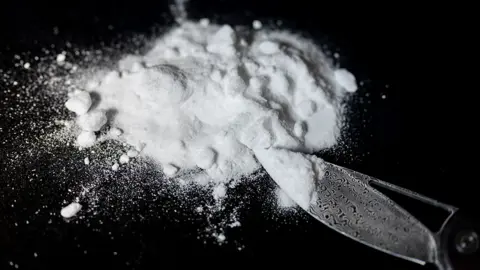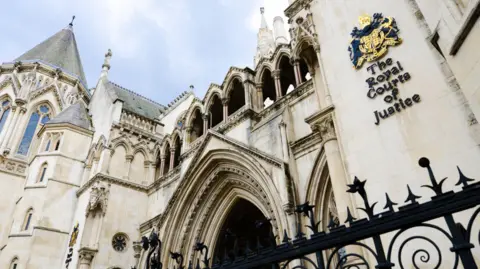Mum 'gave son ketamine' even as it risked his life
 Getty Images
Getty ImagesA vulnerable teenager whose ketamine addiction has left him with life-threatening health problems was allegedly given the drug by his own mother, a court has heard.
The "frail and emaciated" 18-year-old, from Lancashire, has had stents fitted to relieve pressure on his kidneys, a side-effect of bladder problems caused by abusing ketamine since he was 12.
The man, referred to in court as GWS, has only spent 33 days out of hospital since December due to ketamine-related complications.
After he asked to leave hospital despite a "clear risk of death", the Court of Protection ruled last week that he lacked the capacity to make decisions about his own medical care.
The court heard GWS was taken to A&E in June severely malnourished and with a suspected gastrointestinal bleed and infection.
An NHS trust successfully obtained a deprivation of liberty order.
It also asked the Court of Protection to rule that the teenager lacked capacity to make decisions about his medical care.
The trust urged the court to prevent GWS from discharging himself before a "long-overdue" procedure to replace the kidney stents, which must happen every six to nine months to prevent life-threatening blockages.
It also highlighted that GWS had no suitable accommodation lined up since a supported living provider said it could not manage his health risks.
The court heard that, as a result, he was at real risk of living on the streets while in a dangerously frail condition.
GWS also had diagnoses of ADHD and post-traumatic stress disorder, as well as traits of autism.
These factors were also raised as concerns about his mental capacity.
When asked to give evidence, doctors said that if GWS self-discharged, "there [would be] a real risk he would die".
Sophia Roper KC, representing the NHS trust, told the court GWS's ability to make rational decisions was impaired by a "perfect storm" of poor mental and physical health, chronic addiction to ketamine and childhood trauma.
In her ruling published last week, Mrs Justice Theis DBE, Vice President of the Court of Protection, said she agreed with Ms Roper that the evidence showed GWS was "not using and weighing up the relevant information about treatment".
 Getty Images
Getty ImagesThe judge said she agreed that GWS had "no real grasp of reality of what it would be like if he walked out".
The court heard GWS had suggested he could return to live with his mother, but Mrs Justice Theis said this was "wholly unrealistic".
She wrote: "His history reveals his mother had chronic mental health difficulties and alcohol abuse, as a consequence she struggled to impose any boundaries or provide consistent care from when GWS was six months old.
"More recently she has been accused of providing GWS with ketamine."
The court also heard GWS had likely been exploited to move drugs by his dealers.
'Extraordinarily difficult background'
Government figures estimate ketamine use in England and Wales has more than doubled since 2016.
For GWS, the damage caused by the drug became clear in 2023 when he suffered symptoms including blood in his urine.
He was diagnosed with a ketamine bladder syndrome, where the bladder thickens and has very little capacity.
In 2024 his condition worsened and he was further diagnosed with bilateral hydronephrosis - dilation of both kidneys due to obstruction caused by the thickened bladder.
It necessitated the insertion of the stents to prevent kidney damage.
These have to be replaced about twice a year under general anaesthetic.
The court heard GWS's health worsened as he continued to take ketamine.
Mrs Justice Theis wrote that despite his "extraordinarily difficult background" GWS was "polite and considerate" and remained "optimistic" about living independently.
She said she hoped the stent procedure would take place as soon as possible and that suitable accommodation could be offered soon so "he can start taking the steps towards achieving the independence he so clearly wants".
Listen to the best of BBC Radio Lancashire on BBC Sounds and follow BBC Lancashire on Facebook, X, and Instagram and watch BBC North West Tonight on BBC iPlayer.
